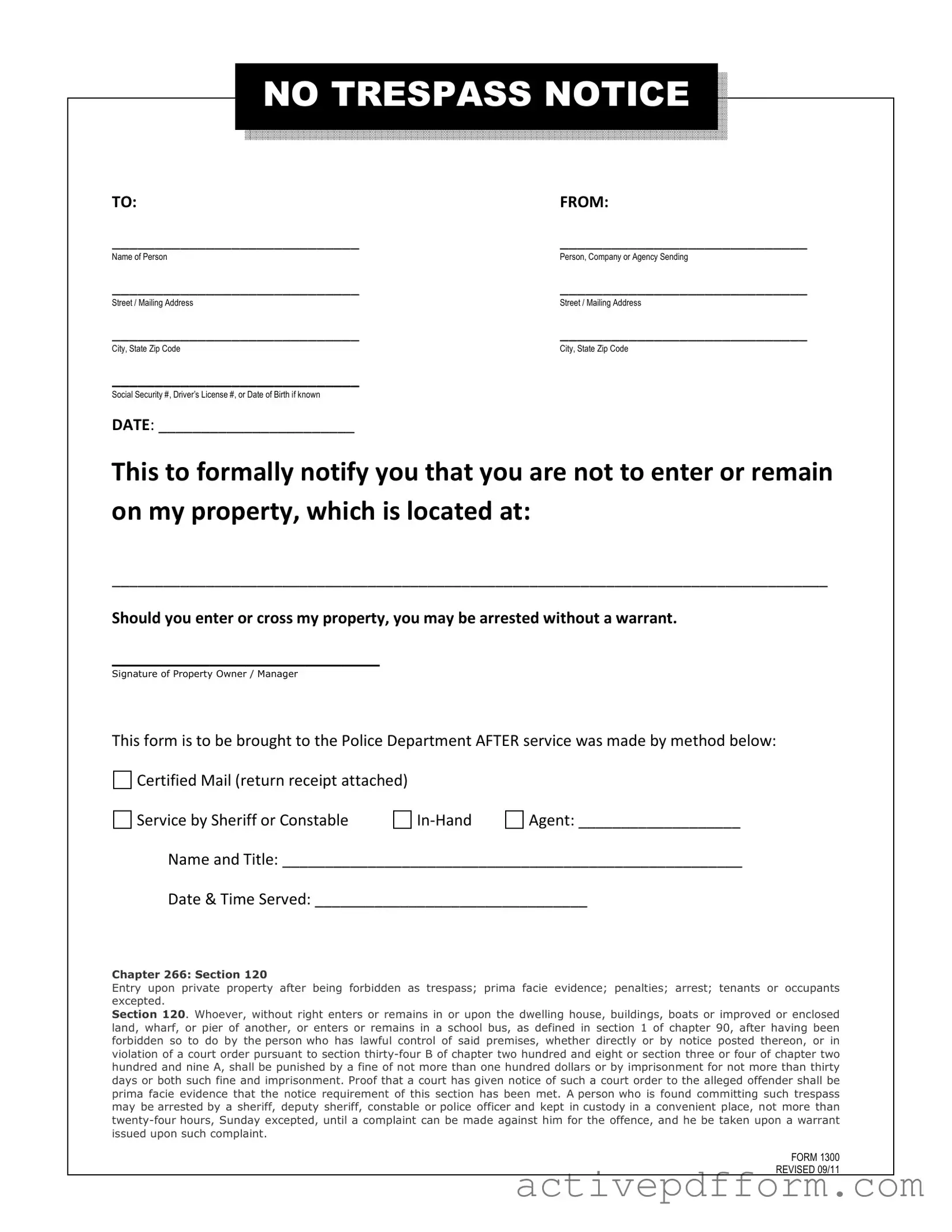Free No Trespassing Letter Template
A No Trespassing Letter serves as a formal notice to individuals that they are prohibited from entering or remaining on a specific property. This letter is essential for property owners who wish to assert their rights and maintain their privacy. The form typically includes the names of both the sender and the recipient, along with the date and the exact location of the property in question. Importantly, it warns that any unauthorized entry could result in arrest without a warrant. To ensure the letter is legally recognized, it must be delivered through specific methods, such as certified mail or in-person service by a sheriff or constable. The form also requires documentation of the service details, including the name and title of the person delivering the notice, as well as the date and time it was served. By utilizing a No Trespassing Letter, property owners can effectively communicate their boundaries and take necessary steps to protect their rights.
Document Specifics
| Fact Name | Description |
|---|---|
| Purpose | A No Trespassing Letter formally notifies individuals that they are not allowed on a specific property. |
| Sender Information | The form requires the sender's name and address to establish who is issuing the notice. |
| Recipient Information | The recipient's name and address must be included to identify who is being warned. |
| Property Description | The letter must include a clear description of the property to avoid confusion. |
| Legal Warning | The letter states that trespassing may result in arrest without a warrant. |
| Delivery Methods | It can be delivered via certified mail, sheriff or constable service, or in-hand delivery. |
| Documentation Requirement | A return receipt is necessary if the letter is sent by certified mail. |
| State-Specific Laws | Each state has its own laws regarding trespassing. For example, in California, Penal Code § 602 addresses trespassing laws. |
| Agent Information | The form allows for an agent to be designated for service, including their name and title. |
| Service Confirmation | The date and time of service must be documented to verify that the notice was delivered. |
Similar forms
The No Trespassing Letter serves a specific purpose in property law, but it shares similarities with several other legal documents. Here are eight documents that are comparable, along with their respective functions:
- Cease and Desist Letter: This document instructs an individual or entity to stop a specified action, similar to how a No Trespassing Letter prohibits entry onto property. Both serve as formal warnings before further legal action may be pursued.
- Eviction Notice: An eviction notice informs tenants that they must vacate a property. Like the No Trespassing Letter, it asserts the property owner's rights and outlines consequences for non-compliance.
- Restraining Order: A restraining order legally prevents an individual from coming near another person or their property. Both documents aim to protect the rights and safety of individuals by restricting access.
- Property Deed: A property deed establishes ownership of real estate. While it does not serve as a warning, it functions to assert control over property, similar to how a No Trespassing Letter communicates property boundaries.
- Land Use Permit: This document grants permission for specific activities on a property. It can be seen as a counterpart to the No Trespassing Letter, which denies unauthorized access or use of the land.
- Rental Application Form: This document is crucial for landlords to gather necessary information from potential tenants, assessing their suitability for a rental. Similar to the other documents mentioned, completing the fillable-forms.com accurately can significantly improve one's chances of securing a rental property.
- Notice of Violation: This document informs an individual or entity of their non-compliance with laws or regulations. It parallels the No Trespassing Letter in that both serve to notify individuals of boundaries and legal expectations.
- Access Agreement: An access agreement outlines the terms under which someone may enter another person's property. This is similar to the No Trespassing Letter, which explicitly denies access without permission.
- Lease Agreement: A lease agreement establishes the terms under which a tenant may occupy a property. While it grants access, it also specifies conditions that must be met, much like how a No Trespassing Letter enforces property rights.
No Trespassing Letter Example

TO: |
|
|
|
|
|
|
|
FROM: |
|
|
|
|
_____________________________ |
|
|
|
_____________________________ |
|
|||||||
!" |
|
|||||||||||
|
|
|
|
|
|
|
||||||
_____________________________ |
|
|
|
_____________________________ |
|
|||||||
##"$"!! |
##"$"!! |
|||||||||||
|
|
|
|
|
|
|
|
|
|
|
|
|
_____________________________ |
|
|
|
_____________________________ |
|
|||||||
"###%"! |
"###%"! |
|
|
|
|
|||||||
|
|
|
|
|
|
|
|
|
|
|
|
|
_____________________________
"$ &"#'"()*"
DATE: _______________________
This to formally notify you that you are not to enter or remain
on my property, which is located at:
____________________________________________________________________________________
Should you enter or cross my property, you may be arrested without a warrant.
This form is to be brought to the Police Department AFTER service was made by method below:
Certified Mail (return receipt attached)
Service by Sheriff or Constable |
Agent: ___________________ |
|
|
|
|
Name and Title: ______________________________________________________
Date & Time Served: ________________________________
! !!
! ! ! !" #$!
! !
%&
'!
( '
! !)!
% !! ! )
Understanding No Trespassing Letter
What is a No Trespassing Letter?
A No Trespassing Letter is a formal notice that informs an individual they are not permitted to enter or remain on a specific property. This document serves as a clear communication of the property owner's wishes and can help prevent unauthorized access. It is important for property owners to establish boundaries and protect their rights.
How do I fill out a No Trespassing Letter?
To complete a No Trespassing Letter, start by filling in the names of the sender and recipient at the top of the form. Include the property address where trespassing is prohibited. Clearly state the date of the letter. Make sure to include a statement that informs the recipient they may be arrested for trespassing. Lastly, indicate how the letter will be served, whether by certified mail, sheriff, constable, or in person, and provide the necessary details for the service method chosen.
What should I do after serving the No Trespassing Letter?
After serving the No Trespassing Letter, it is advisable to bring a copy to the local Police Department. This step helps ensure that law enforcement is aware of the situation and can act if necessary. Keep a record of the service method used and any relevant details, such as the date and time served, to maintain a clear account of the actions taken.
Can a No Trespassing Letter lead to legal action?
Yes, a No Trespassing Letter can lead to legal action if the recipient violates the terms outlined in the letter. If the individual enters or remains on the property after receiving the letter, the property owner may contact law enforcement to report the trespass. The police may take action, which could include arresting the individual without a warrant, depending on the circumstances.
Is a No Trespassing Letter legally binding?
A No Trespassing Letter is a legally recognized document that communicates the property owner's intent to restrict access to their property. While it does not require a signature from the recipient to be effective, it must be properly served to establish that the individual is aware of the restrictions. The effectiveness of the letter can depend on local laws and regulations regarding property rights and trespassing.
Dos and Don'ts
When filling out the No Trespassing Letter form, there are important guidelines to follow. Here’s a list of things you should and shouldn’t do:
- Do write clearly and legibly to ensure your message is understood.
- Do include all necessary information, such as your name, address, and the date.
- Do specify the property you are referring to in detail.
- Do choose a method of service that is legally recognized, like Certified Mail or Sheriff service.
- Don’t use vague language; be direct about your intentions.
- Don’t forget to keep a copy of the completed form for your records.
- Don’t delay in delivering the notice; act promptly to ensure it is received.
Check out Common Templates
Da - Each form should clearly identify the receiving party and the items being issued.
For those looking to efficiently complete their transactions, the streamlined Ohio bill of sale procedure can significantly simplify the process. You can find a helpful resource at this online bill of sale platform that guides you through the necessary steps.
Chick Fil a Workers - Enjoy competitive pay and benefits as you work with us.
